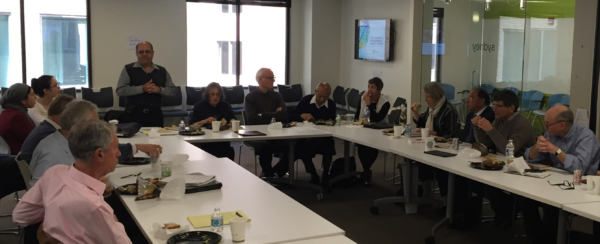
Civil society’s place in development has changed significantly over the last 15 years. PTF has analyzed several global trends concerning these changes and their implications for various stakeholders in a forthcoming publication, Civil Society & Development: Global Trends. On April 13, 2016, we held an event at the OpenGov Hub to share our preliminary findings and gain feedback from likeminded organizations.
In 2000, civil society was on the periphery of the Millennium Development Goal (MDG) agenda setting process. There were well-organized sector networks lobbying on specific issues, but most governments and international organizations did not proactively seek CSO contributions. The recent agenda setting around the Sustainable Development Goals (SDGs), on the other hand, mobilized remarkable civil society activity that influenced several outcomes. In fact, the preamble of the Goal adopted by all UN member countries, states “all countries and all stakeholders, acting in collaborative partnership, will implement this plan.”
The research presented in Civil Society & Development: Global Trends examines the changing nature of civil society, identifying six global trends, as presented by PTF’s Chief Technical Officer, Vinay Bhargava [download presentation]:
- Civil society has grown in size, diversity and influence and is being recognized as a key development partner together with government and the private sector.
- Funding for development is changing. Private aid sources are growing and being integrated into innovative financing partnerships with official aid donors and governments.
- International organizations are forging collaborative relationships with CSOs as development partners.
- Civil society is taking initiatives to enhance its own governance and accountability.
- Despite these developments, the space for civil society engagement in the development policies and programs varies widely from country to country and sector to sector.
- Future funding is a growing concern of CSOs.
Dr. Bhargava’s presentation was followed by a lively conversation around the implications of the six trends for the development community. Much of the discussion focused on the wide variety of CSOs and the relatively different challenges they face. CSOs are incredibly multifaceted by nature, and as such, face a wide variety of advantages and restrictions to their sustainability, activity and influence. In particular, it was noted that social change agents, who are seeking to advocate for more progressive institutions and practices, are more likely to face constraints than charitable organizations.
It was also argued that while the international community has recognized the value of CSOs, particularly with respect to their role in articulating the interest and concerns of citizens, methods of engagement lag behind. The concern is that current arrangement co-opt civil society as contractors for traditional development partners, rather than allowing them to operate as independent actors.
Please share your comments below and be on the lookout for the release of Civil Society and Development: Global Trends this summer.

